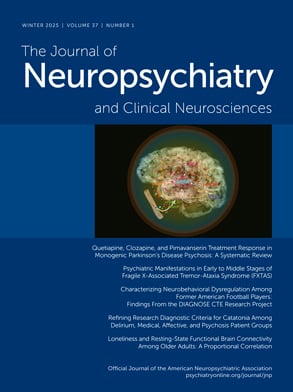SIR: Regarding our finding that alcoholic denial is often associated with cognitive dysfunction, Dr. Strauss points out that alcohol-related cognitive impairments often partially resolve after 3 to 6 months of sobriety. He suggests that the credibility of our conclusions would be greater if we had conducted the study after “most of the effects on cognition from alcohol had cleared.”
Of course, there are practical difficulties in attempting to study the relationship between denial and cognitive dysfunction after the cognitive dysfunction has partially resolved. However, it is instructive to consider various possible outcomes of a hypothetical extension of our study to include a 3- to 6-month follow-up assessment. Under one scenario, both the cognitive dysfunction and the alcoholic denial would resolve. That outcome would support our proposition that the denial was related to cognitive dysfunction. In the alternative scenario, the cognitive dysfunction would resolve while the alcoholic denial remained strong. That would suggest that some alcoholics are simply chronically high in denial, regardless of their current degree of cognitive dysfunction. However, that hypothetical outcome would not invalidate our (actual) finding that high-denial alcoholics were more cognitively impaired than low-denial alcoholics during the first few weeks of abstinence. At best, such an outcome would cause us to reinterpret our initial findings as indicating that these chronically high denial alcoholics are highly susceptible to cognitive impairment in the early stages of recovery. It is unlikely that the association of high denial with cognitive dysfunction in early recovery was simply coincidental, given that low-denial alcoholics did not show similar cognitive impairments at the same point in their recovery.
On a related point, it is somewhat uncommon for high-denial alcoholics to remain abstinent for as long as 3 to 6 months, especially prior to treatment. Thus, in their usual condition these patients are likely to be cognitively compromised. If that cognitive dysfunction contributes to their denial, this is a clinically important issue that should be taken into account in treatment planning.
We should point out that neither the neuropsychological assessment nor the assessment of denial occurred while the subjects were actively detoxifying or acutely confused. This notwithstanding, Dr. Strauss is correct that some aspects of alcohol-related cognitive impairment tend to improve with increasing lengths of abstinence. Plans are currently being drafted to investigate how short-term changes in cognitive status affect the patients' level of denial.
More broadly, Dr. Strauss is not unreasonable in his intellectual skepticism about the role of cognitive impairment as a central determinant of alcoholic denial. We do not contend that all alcoholics in denial are cognitively impaired. We do believe that such impairments contribute to denial more commonly than is generally recognized. Additionally, we do not contend that emotional defensiveness plays no role in alcoholic denial. We do feel that the exact role of affective compared with cognitive factors in alcoholic denial is poorly understood. A follow-up study is currently under way in which we are assessing the role of both cognitive dysfunction and distress reduction in alcoholic denial.

